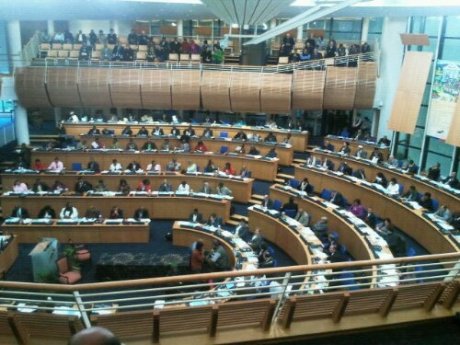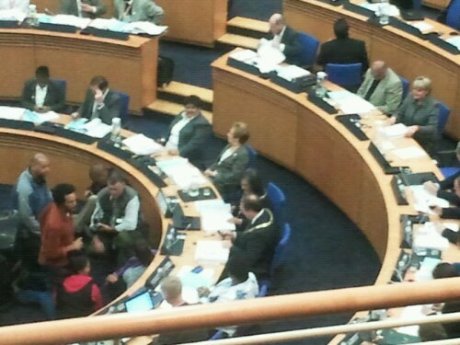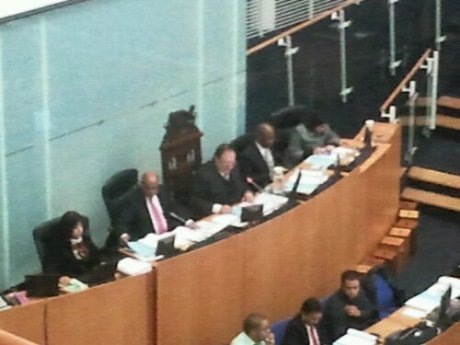Why Strikes would be less frequent in an Open Opportunity Society July 17, 2011
Posted by cmfry in DA, Politics.Tags: Collaborative Leadership, DA, Politics, South African, Strike action
add a comment
This past 2 weeks, South Africa has been subject to yet another striker season. In a previous post, I outlined how the use of violence has highlighted the need for greater synergy in the South African market place. This is all to clear, as this the National Employer’s Association of South Africa (NEASA) has now turned to the courts, and have gained and interdict against striking workers to prevent any further damage to property.
Now, as stated earlier, synergy exists in its purest form when effective collaboration happens. Dr. Tim Stagich, in his book , “Collaborative Leadership and Global Transformation”, has noted that the foundations for effective collaboration between any parties would be:
- Reciprocal benefit (where all parties are advantaged from any decision made)
- A Healthy respect for one another
- An Appreciation of diverse contributions to be made
- A shared understanding of how these values work in a collaborative process
The absence of these values in the present situation, and to a large extent in many of our communities, is painfully clear. I would venture to guess that one of the main reasons that the workers would put forward for the strike would be that they feel that they have lost a significant amount of dignity, through a continuous erroding of resources (Money, power, etc) which has critically eroded their opportunity to maximise their own potential.
But what if we create the platform for them to do just that? What if we create a sustainable environment for people to interact with one another in a collaborative, synergistic way in a way that only South Africans can?
The Open Opportunity Society for All notes three concepts that are critical to creating a sustainable environment for the individual to maximise their potential. They are:
- Individual Freedom under the rule of law
- Opportunity with responsibility
- Full equality for all
Once we have a society where these 3 factors are present, the right to human dignity will become entrenched, and from that space of human dignity, a healthy respect for one another, an apppreciation of divergent views and how these values can work in a collaborative way can be achieved. This, then would form the basis for the transformation of our society into one where the quest for reciprocal benefit would be sustainable. Furthermore, once a lasting sense of human dignity is achieved, a deeper commitment to achieving a collaborative society is generated.
A classic example of this technique, as quoted by Stagich in his book, is the peace agreement between Egypt (under Anwar Sadat) and Israel (with Menachem Begin as prime minister) with former US president Jimmy Carter as facilitator. The process moved toward a general understanding between the two parties once a mutual respect was built. This led to differences being transcended, and ultimately, a peace accord signed.
For more on the Open, Opportunity Society, please see a short policy platform here.
In closing, the quest for achieving this level of cooperation will not subvert or diminish the right to strike, neither should it superceded any right of any individual. However, once we, as a South African society, can learn to resolve our differences without using the tactics of the past, we will truly be on the path to acheiving an even deeper level of greatness than we already have.
Democracy as a way of life June 27, 2011
Posted by cmfry in Cape Town, DA, Politics.Tags: Cape Town, conservation, DA, Politics
add a comment
This past Saturday, our family spent some time with my wife Natasha’s colleague and friend, Bongani Mnisi, his wife Lulama and their little daughter, Tisani.
Around the braai fire, Bongani and I had quite an interesting discussion around the City of Cape Town and the relationship between democracy and conservation in the city. The conversation was interesting in that he is a manager within the field, and I, of course, was talking from a DA viewpoint. He was making the point that politicians from both the ANC and DA have made democracy an ideal, instead of a way of life. He was saying that when he speaks conservation, he has to use different terminology to people from Constantia, as opposed to people from Cafda, but not because they might have different education levels, or interest levels. It stems from the mere point that conservation means different things to people from different areas, yet we all share the bountiful splendor of the natural beauty that is Cape Town. For some of us, conservation is a means towards a better understanding of our city, but for others, conservation might be a barrier in daily survival.
And wrapped up in all of this, the discussion eventually came to the point where we debated whether democracy had just become an ideal, that is building better roads, infrastructure and housing, or whether we should strive for it to become a way of life. Should we not be striving for our people to be exercising democracy in everything they do, including something as important (especially in the Cape Town context) as conservation? Yes, we should be building houses, bulding roads, improving social infrastructure, and creating economies of scale, but are we doing it to improve the lives of our citizens, or are we doing it to create the illusion of democracy?
Racialism : The DA’s Rubicon June 16, 2011
Posted by cmfry in DA, Politics, Uncategorized.Tags: DA, Politics, Racialism
add a comment
In South Africa, today is Youth Day. We celebrate the youth’s invaluable contribution to the struggle for liberation. It is especially poignant today as, on June 16, 1976, the Soweto uprising occurred where students took to the streets in protest of Afrikaans being the language of instruction for Bantu Education (as stipulated by the apartheid government). It is widely believed that uprising kick-started the liberation struggle in South Africa which resulted in democracy in 1994.
However, in the light of the recent local government elections, and subsequent commentaries by various ministers, the African National Congress seems hellbent on using racialism as a means to cling to power. In the recent election debates, through various media, virtually every ANC had no viable strategy for combating the corruption and cronyism that has cripled move than half of the municipalities in this nation. As a result, the Democratic Alliance‘s message of “Service Delivery for all” was embraced by more voters in different regions by various racial groups than ever before. Among black voters, although the gains were small, the percentage increase was significant enough for most political journalists to sit up and take notice of the DA’s rising influence in the local government halls of power.
However, as long as the ANC persists with the racial card, the DA will find it difficult to garner enough support to change the balance of power in parliament. The DA’s greatest challenge right now is that its leadership does not adequately represent all the racial groups within South Africa. The task of redressing this issue, in my humble opinion, is certainly not insurmountable. The strategy increase support in the May 18 election clearly worked, and to keep the momentum going, I would say a 3-pronged strategy would be needed.
Firstly, we have to continue to grow leaders from within. The DA Young Leaders program and the LEAD project has unearthed some young, raw talent that already has been converted to competent public representation. In the YLP class of 2008, my year, 4 people are now local councillors, 3 run the DA Youth wing, 1 came within 800 votes of the Kwazulu-Natal legislature, and virtually all of us are involved in DA political activity in some shape or form. This is clearly a good breeding ground for talent, and would complement other efforts to raise the party’s profile among all race groups. There are other leaders like Lindiwe Mazibuko and Mmusi Maimane, who have not come through LEAD or the YLP. The process of growing these leaders from within will be slow, but the fruits of it are already being seen.
Secondly, the strategy of using the web as means of communication and awareness must continue. The DA used the platforms of Twitter and FaceBook extremely well in the election campaign. As complimentary to this, other forms of mobile communication can be used to convey the message of the Open, Opportunity Society for All. There have been 2 mobile communication conferences in Cape Town in the past 2 weeks, and both of them have explored the vast opportunities that have arisen out of the rise of the smartphone. While this technology might not be available to all at present, it will almost certainly define the future of communication. Exploiting the opportunities presented now will ensure that the DA remains the leader in mobile communication within the political sphere
Although the above points are important, they pale in comparison to the last one. DA leaders who have worked hard to gain a significant media presence, but be constantly seen in areas in which the DA would not normally be associated with. And those of us who have a rising profile must use the opportunity to be seen spreading the party message in all parts of our land. This strategy, used effectively until the 2014 General Election, will ensure that by then, we would have made significant inroads into the racial debate to which the ANC currently holds so dear. Using a mixture of young and established leaders in these areas will demonstrate the seriousness of the DA’s intention to be a party for all South Africans. Once this is achieved, the quest for governance in 2014 will be a significant factor in yet another change in South Africa’s political landscape.
To close, in 49 B.C. , Julius Caesar, after amassing a sizable military (and wealth), had to decide whether to follow the Roman protocol and surrender his army, or cross the Rubicon, declare war on the present, and change history forever. Before crossing the Rubicon, he famously declared, “Alea Jacta Est” (The die is now cast).
Forward to the day when Helen Zille stands at the gates of parliament and cries,
“Isinqumo sesithathiwe”
Patricia DeLille installed as Mayor of Cape Town June 1, 2011
Posted by cmfry in Cape Town, DA, Politics.Tags: Cape Town, Council
2 comments



I was privileged to be present in the council chamber at thee inaugural meeting of the city council of Cape Town, held on 1 June 2011.
As council meetings go, this was about as dignified as they come. And everything went according to plan, with Dirk Smit installed as speaker, and Patricia De Lille elected as mayor.
In her speech, she reiterated her commitments made during the campaign, with the fervour and zest that characterises her career. She outlined how Cape Town would become a more caring city through addressing various social issues including back yard dwellers, expanding the IRT system and engaging service delivery for all. She also thanked previous mayors, Dan Plato and Helen Zille, who was in the gallery.
The new mayor’s speech for the most part, drew the ire of the ANC, with the speaker having to call the house to order on more than one occasion.
In the reply session, Tony Ehrenreich, the ANC mayoral candidate continued to beat the same drum as during his campaign, bringing up the Makhaza toilet saga yet again, while bringing up the incorrect notion that the DA does not care for poor people. It is indeed sad that a man of his intellect can be so dishonest and driven by the nefarious agenda of others.
Ian Nielsen was voted in as Deputy Mayor & Anthea Serritslev elected unopposed as Chief Whip of the council.
Attached are some photos taken in the chamber.
Finally, my thanks to Alderman Garin Cavanagh for the invitation to attend today’s meeting.
Response to ‘DA Whitewash’ April 20, 2011
Posted by cmfry in DA, Politics.Tags: Cape Times, Cape Town, DA
add a comment
Below is my response to a letter in the Cape Times of 20 April 2011 by Councillor Jabu Mfusi of the City of Cape Town. It was sent to the Editor of the Cape Times.
In reply to Councillor Jabu Mfusi’s letter, ‘DA Whitewash’ (20 April 2011, Cape Times), the only thing one can really say is facts, figures and actions speak for themselves.
The DA has delivered to all areas of the City of Cape Town, as well as other DA-led municipalities. This is supported by the DA’s delivery blog (http://thedadeliverydaily.com/) which outlines instances where DA-run municipalities have delivered and submits evidence to each fact.
Furthermore, the fact that the DA’s leadership is fast evolving to represent all its various constituencies shows that an increasing amount of competent, capable leaders from all backgrounds are buying into the vision of the Open, Opportunity Society for All.
Finally, the Deputy President has already stated that the ANC is not in a position to win back the City come May 18. The Councillor will do well to note that the City is far better off than it was under ANC rule. Surely, the people of Cape Town would want this trend to continue.
